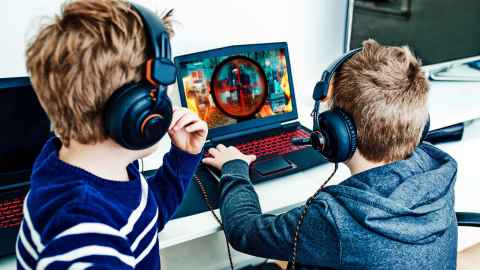How does screen time affect children?
6 September 2021
Seven out of eight Kiwi kids exceed recommended recreational screen time guidelines, but what is their significance and how should they be interpreted?

A new peer-reviewed evidence brief, Screen time: The effects on Children’s Emotional, Social and Cognitive Development, produced by Koi Tū: The Centre for Informed Futures at the University of Auckland, synthesises the most-up-to-date national and international research about the effects of recreational screen time on children’s development.
It includes watching television, using social media platforms, and playing games but excludes screen time used for education in class or homework.
The authors, Chloe Wilkinson, Dr Felicia Low and Sir Peter Gluckman, say the effects of non-educational screen time on children’s brain and behavioural development are complex and depend on many factors, including the type of screen activity, the level of engagement by caregivers, and if the content is age appropriate.
They say blanket screen limits don’t reflect contemporary family life. Instead, they recommend a family-centric approach where parents and caregivers aim to be more involved in their children’s screen time by monitoring content, choosing interactive screen activities rather than passive watching, and balancing screen use with family time.
The negative impacts are strongest when children use non-interactive, non-educational media instead of talking and playing with people and objects around them.
Dr Low, whose work is supported by the Wright Family Foundation, says there is growing evidence that screen time can negatively impact children’s ability to focus their attention and regulate their behaviour and emotions.
“The negative impacts are strongest when children use non-interactive, non-educational media instead of talking and playing with people and objects around them,” she says.
The Ministry of Health recommendations for children’s recreational screen time suggest zero use for children under two years of age, less than one hour per day for children aged two to five, and less than two hours per day for children aged five to 17.
Yet the 2019/20 New Zealand Health Survey reports that 88 percent of children aged from under one to 14 exceed the guidelines. Excessive recreational screen time increases with age, with approximately 60 percent of two to four-year-olds, 80 percent of five to nine-year-olds, and over 90 percent of 10 to 14-year-olds watching screens for more than two hours per day.

Dr Low says studies of teenagers have linked excessive social media and internet use with poor mental wellbeing, impaired cognition and sleep disturbances.
“We don’t know if this is a cause or consequence – if it’s causing problems or if it’s a symptom of teenagers with these problems using more social media and internet,” Dr Low says.
However, she says researchers generally agree on the 'Goldilocks effect'. “Just like finding the perfect temperature of porridge, not too little or not too much but a moderate amount is optimal for teenagers’ mental wellbeing,” she says.
Sir Peter acknowledges that during Alert Levels 3 and 4 it may be impossible for many families to adhere to the guidelines, as caregivers juggle caring for their children, homeschooling, and working remotely.
“What we need to focus on is not allowing the realities of lockdown to creep into everyday life and become the habits of the future.”
New screen time guidelines published by Koi Tū include:
- Avoiding passive screen time for children under two years of age. Caregivers must be mindful of their own device use and whether itinterrupts adult-child interaction.
- Choosing educational content for preschool-aged children and join in with their viewing whenever possible.
- Monitoring the content older children are exposed to, particularly with adult-rated movies and games, investigate parental controls on devices, and prioritise interactive screen time such as computer use over more passive options such as television.
- Encouraging and role modelling a balance between screen time and other activities. Place limitations around screens where needed, for example, noscreen use near bedtime and no devices in bedrooms.
- Discussing the pitfalls of social media with adolescents, such as the potential for cyberbullying and the unrealistic editing of images. Check in with teens regularly and be vigilant for any mood changes.
Media contacts
Distinguished Professor Sir Peter Gluckman | Director, Koi Tū: The Centre for Informed Futures
M: +64 21 775 568
E: pd.gluckman@auckland.ac.nz
Jill Rolston |Communications manager, Koi Tū: The Centre for Informed Futures
M: +64 21 983 034
E: jill.rolston@auckland.ac.nz